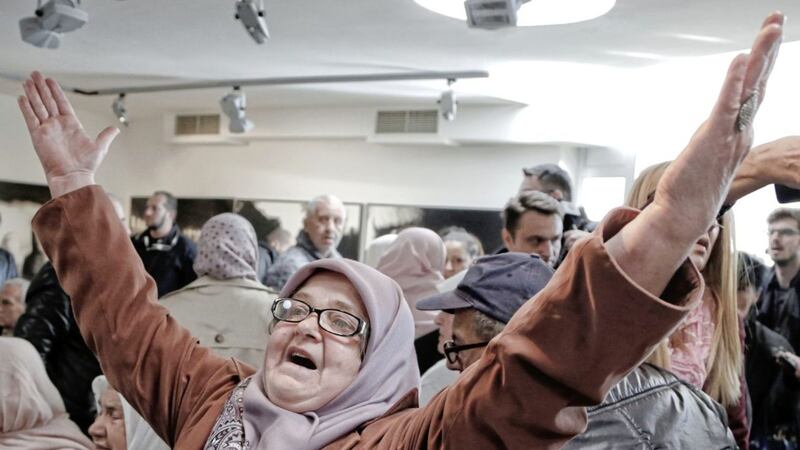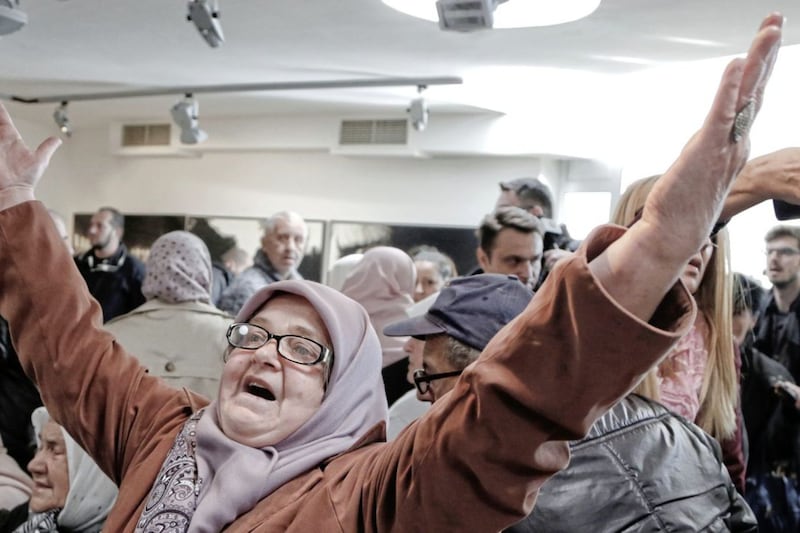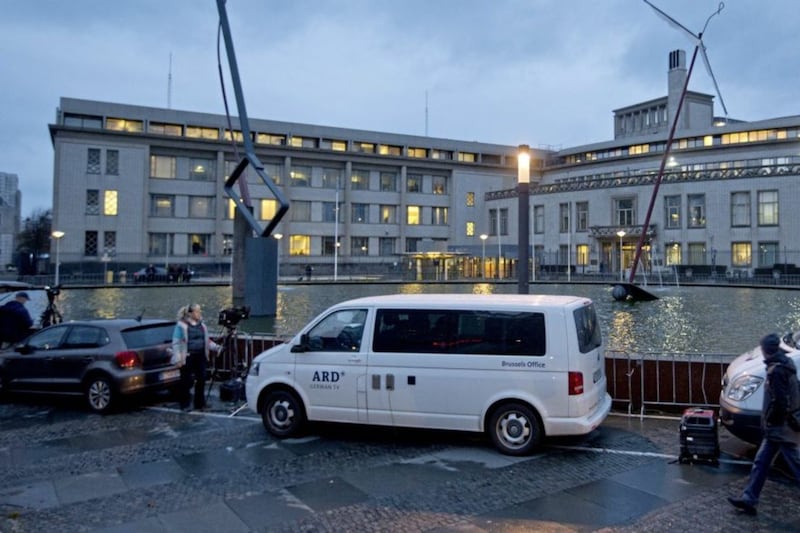ON the top floor of a nondescript building in Sarajevo, beside the city's Catholic cathedral, you will find a long, carefully lit corridor.
Occupying most of the space on one wall is a large panel.
Impossible to ignore, it pins you to the spot, painfully catching your eye as if it were a magnet dropped in a box of nails.
About the length of a bus and around six foot tall, it is covered in neat type, the words roughly the size used in the headlines on the pages of this newspaper.
The words are in fact names. They are arranged alphabetically, making it obvious that the same surnames are repeated many, many times.
Their first names are male, and there are 8,372 listed in all.
These men and boys - grandfathers, fathers, sons, brothers, uncles, nephews, cousins - all died in and around the town of Srebrenica within a bloody few days of each other in the middle of July 1995.
On that July 11, while we were getting excited about Drumcree in our own petty sectarian squabble, thousands of miles away on the far side of Europe Serb forces began systematically murdering thousands of Bosnians because they were Muslims.
Hubris meant that the Serb army filmed many of the atrocities they committed in Bosnia for the entertainment of the audience at home - footage later used to help secure convictions for war crimes.
The latest of those was delivered this week. On Wednesday, Ratko Mladic, the Serb general, was found guilty of genocide by the special United Nations court that has been considering war crimes perpetrated during the collapse of the former Yugoslavia.
Even before he and his troops rolled into Srebrenica in July 1995, Mladic was known as 'the butcher of Bosnia'.
What happened next were crimes "among the most heinous known to humankind", as Presiding Judge Alphons Orie put it as he read out the court's judgment and gave Mladic a life sentence.
The survivors of Srebrenica didn't need anyone to tell them that Mladic was guilty.
They knew already, because they were there.
They were there when thousands of refugees fled Srebrenica and crammed into an old battery factory at Potocari, a few miles away; it should have been a safe haven, as it was under the control of UN peacekeepers, in the guise of Dutch soldiers.
It would be crass to draw comparisons too tightly, but there are at least resonances between the Bosnian experience - with its competing views of nationalism, religion and the past - and our own Troubles
They were there when Mladic threatened to systematically kill all of the Muslim men - a hallmark of genocide - and taunted the peacekeepers.
They were there when the Dutch, hopelessly outnumbered on the ground and lacking support, capitulated and effectively handed them over to Mladic.
Chilling eye-witness accounts speak of summary executions and rapes as Serb soldiers picked victims at random from the crowd at Potocari.
A baby had its throat slit because its mother could not stop it crying; children were beheaded; a woman pregnant with twins was cut open and the babies beaten to death.
Television footage shows Mladic's soldiers, disguised as UN peacekeepers, trick groups of fleeing Muslim men into the open and shooting them.
Men and boys were loaded on to buses and lorries and brought to execution sites, where they were dumped into mass graves.
It is unspeakable and seems otherworldly - until you remember that these horrors happened in Europe, to people like you and me, as recently as 22 years ago.
It would be crass to draw comparisons too tightly, but there are at least resonances between the Bosnian experience - with its competing views of nationalism, religion and the past - and our own Troubles.
There are post-conflict echoes, too. Politics hasn't worked there either, nor is there any agreement on how to deal with legacy issues or victims.
We have had a fresh reminder of that this week, with the spectre of a Troubles amnesty returning to haunt what passes for our own political debate.
It goes to the heart of how we consider justice.
Do we take the view of Darko Mladic, who not only denounced the judgment against his father as wrong but also said: "It does not achieve anything... and will be an obstacle to future normal life in the region."
In Northern Ireland terms, that's the 'let sleeping dogs lie, victims and society should move on' position, the 'let's not bother with investigating collusion or atrocities like Loughinisland and Enniskillen' argument; let's offer an amnesty, because raking over the coals of the past will just re-ignite old enmities in the future. Would Mladic, a soldier who argued he was following orders, deserve an amnesty?
Or do we follow Munira Subasic, a Remembering Srebrenica ambassador and president of the Mothers of Srebrenica Association.
She explained how her world had changed when her son and husband "were taken from me in the most brutal and inhumane way imaginable".
"I have now waited for over 20 years for the man responsible for their deaths to face justice and I am pleased he has finally been held to account but this verdict will never bring back the thousands of lives he has destroyed."
An amnesty for Mladic and his cronies just wouldn't have cut it; her words will resonate with many victims of the Troubles hungry for justice in the circumstances around their own bereavement, life-changing injury or trauma.
How we face up to our own troubled past remains just about most vexed question facing our society. Justice demands that we deal with it correctly.





